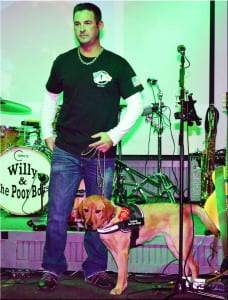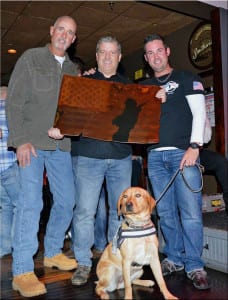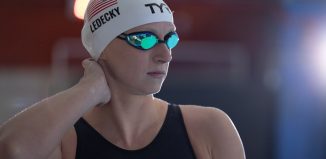By Giselle Barkley
Independence — that’s what veteran Glen Moody is fighting for.

As veterans still struggle with adjusting to life beyond the war, post-traumatic stress disorder is a reality for men and women like Moody, with 22 PTSD-stricken veterans committing suicide daily. Although Moody said he wasn’t suicidal, the California-based Patriotic Service Dog Foundation and a one-year-old red fox Labrador named Independence — Indy for short — are helping make his life a little less stressful.
On Saturday, at Napper Tandy’s Irish Pub in Miller Place, the 35-year-old Afghanistan and Iraqi vet led the Help Glen Bring Indy Home fundraiser, which aims to raise PTSD awareness and raise money to help veterans afford and obtain a PTSD service dog. These service dogs help veterans snap out of flashbacks, anxiety attacks and address other PTSD-related issues. Moody, who was born and raised in Miller Place, mentioned the dogs will also keep an eye on their war heroes — they are trained to guard or protect their vet by sitting in front, beside or behind them.
According to Moody, around 300 people attended the event. He said they raised $20,000 Saturday night, which is double what he hoped to raise. Typically, veterans will get their service dog from the foundation after the dog is 18 months old. But in light of the overwhelming community support on Saturday, Indy will live with Moody until January. This allows Indy to adjust to Moody’s lifestyle in New York.
“Tom was proud to tell me that … no one’s killed themselves [after getting a Tackett dog],” Moody said about the veterans who’ve obtained dogs from Tom Tackett’s foundation — Tackett is a trainer and the president of Patriotic Service Dog Foundation.
The absence of suicide attempts is an accomplishment for the foundation, whose goal is to reduce the statistic from 22 veterans committing suicide down to zero. Tackett could not be reached prior to publication due to technological difficulties, but Moody said he met Tackett after a fellow marine advised Moody’s family to get one of Tackett’s service dogs. The suggestion lead Moody to California in August, where he met Indy.

Moody served as a Fleet Marine Force corpsman with the U.S. Marines from 1999 to 2005. While Moody fought in the front lines, he was also the doctor on the field.
“If anything bad happens, they’ll cry on my shoulder, or if they get shot or blown up, they all come to me,” Moody said. “I’m the one that’s got to treat them first hand.”
The experience left Moody with anxiety attacks and issues with his personal life when he returned to Long Island. He said his PTSD was to a point where it affected his everyday life and those around him. According to Moody’s aunt LynnAnne Daly, Moody didn’t have anyone to turn to during his time of service. She added that there should be more support for causes and providing service dogs for veterans.
“We need to get government funding for this,” Daly said about providing service dogs to veterans. “These men and women are fighting for us.”
According to the Patriotic Service Dog Foundation, around 460,000 veterans from the Afghanistan and Iraq wars suffer from PTSD or brain injuries after or during their time of service. The training period for dogs like Indy starts at eight weeks old until they are 18 months old. With the large portion of veterans suffering from PTSD, Daly added that the fundraiser and the cause “is not just about Glen. It’s about spreading awareness.”
Moody agreed and said he is trying to make a difference, starting with the foundation, the fundraiser and his four-legged companion.
“I’m not the only guy [suffering] — I know I’m not,” Moody said about his PTSD. “When I talk to veterans they say the same thing. We need more awareness and that’s what I’m doing.”






